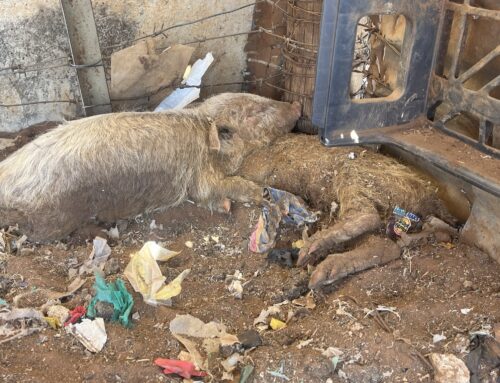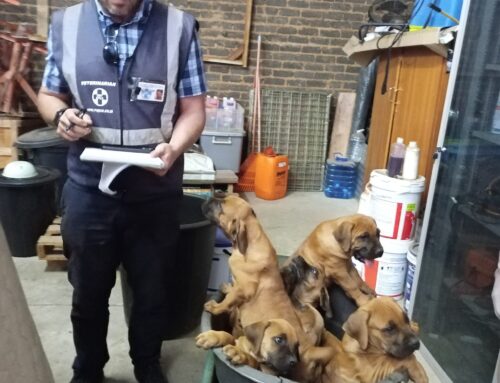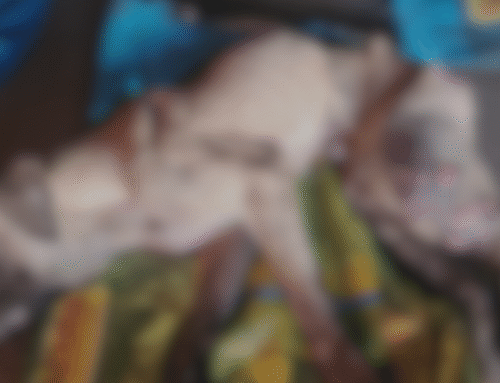Click here for our fact sheet on Animal Hoarding
Is it a case of do-gooders gone wrong? Who or what exactly is an animal hoarder, the latest “syndrome” recognised by animal welfare organisations? As you might have expected, there is plenty of research and scientific analysis of this pattern of behaviour in the USA but it is happening here too and perhaps it’s time the condition was recognised.
If we go back to one of the earliest editions of ANIMALS IN FOCUS, it featured an investigation near Kimberley where a person was living in abysmal conditions in a house with who knows how many animals. Cats, dogs, rabbits, caged birds and even monkeys. You may recall the person in Cape Town who took it upon herself to rescue rats and who ended up with hundreds of rats in her property. Well, in it, around it, under it, near it … until complaints from neighbours led to intervention by the local council on health grounds. Two classic cases of animal hoarding.
A basic definition is that an animal hoarder is a person who amasses or collects more animals than he or she can properly care for. Hoarders generally fail to recognise or refuse to acknowledge when the animals in their care start to become victims of neglect. Overseas, animal hoarders are sometimes referred to as “animal collectors” or “animal addicts.”
This doesn’t mean they are bad people, but it does imply they have gone over the top or lost sight of perspective. Once, whilst on set as an SPCA ad was being filmed, a young man from the advertising agency came up to me and asked if I knew of a certain person. He waxed lyrical of how much she loved cats, adding how many she had at home and asking if I’d ever been to her property. When I asked if he didn’t think this was excessive, he changed tack and began to tell me how the house smelt, that there were cats locked in every room and so on. This is clearly a dedicated person but who has gone that bit too far. My “informant” was also very obviously sussing out my reaction before spilling the beans. He was referring to a kind, motivated person but who had taken the dedication to extremes.
No comprehensive psychological study has been made of the hoarder syndrome. Most people tend to think of hoarders as people motivated by a love of animals but which got out of control. True but it’s more than that. The obvious characteristic of a hoarders is the need to have many animals around. But studies indicate that hoarders are intelligent, communicate well and have a shrewd ability to attract sympathy to themselves, no matter how neglected their animals might be. This is usually combined with a stubborn refusal to part with any of their animals whether through adoption or euthanasia of sick ones. Here is often a stark contrast between the hoarder’s public persona and his or her private life. Reality is often denied – hoarders insist that all their animals are healthy and comfortable, including those confined for long periods in small cages or kennels.
A hoarding situation is arguably one of the most difficult that SPCA personnel have to face and deal with because those involved genuinely believe they are acting for the good of animals; – the person lady who takes in homeless cats but who fails to have them sterilised, for example. It soon becomes an overwhelming task.
There is a common perception that reverence for life is synonymous with preservation of life, regardless of quality. This also links in with the “hero / martyr” complex. People who are effectively animal hoarders do tend to receive favourable publicity about the personal sacrifices they make on behalf of animals. No doubt, they then become enamoured with their own public image and would certainly not risk tarnishing it by relinquishing or euthanasing animals.
It’s a tricky situation for an SPCA to deal with, especially as the public image of private or organised hoarders is that they do not kill animals. Most people do not understand that keeping animals alive in the environment that hoarders often provide inevitably leads to intolerable suffering. Compassion for hoarders is not misplaced if you recognise that most of them are in desperate need of psychological help. What hoarders do not need is the type of sympathy and support which would enable them to continue harbouring and acquiring even more animals.
Support your SPCAs, morally and financially. SPCAs focus on spaying and neutering of animals, carry out home checks before an animal can be released to a new home – and SPCAs enforce the Animals Protection Act. Work to educate others about the “hoarder” syndrome, the individuals who can aptly be described as addicted to animals. They often receive sympathy – being perceived as keeping animals alive that would otherwise be euthanased at an SPCA. But animals for whom responsible homes cannot be found are not better off “warehoused” or in infernal living conditions. Quality of life is the issue. It’s what every animal deserves.
If you come across a situation that smacks of “animal hoarding”, please let your local SPCA know. It’s worth checking out for the sake of the animals. Whether it’s rural or in a built-up area, any property which appears to have far too many animals for their own comfort may be worth checking out. It may be one person with an excess of animals – too many to care for. It may be a situation that has grown beyond an individual and has now set up as a back-yard or home-made animal shelter on the property. Either way, animal hoarding is a recognised syndrome and the more we know, the more we can do.
If you are as passionate about animals and their well-being as we are, consider supporting our causes by donating.
Latest News Posts
Will You Be the One Who Takes Action?
Most people will scroll past this. But will you be the one who stands up for animals?
Animal welfare isn’t always in the spotlight, but it changes lives – for every neglected, abused, or suffering animal we help. Our teams work tirelessly, often behind the scenes, ensuring animals across South Africa are protected.
This work is relentless. The challenges are immense. But with more hands, hearts, and resources, we can do even more.
The equation is simple: the more supporters we have, the greater our reach, the stronger our impact.
Be part of the change. Become an NSPCA Project Partner today. From just R50 per month, you can help ensure that no animal suffers in silence.








